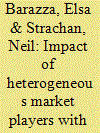| Srl | Item |
| 1 |
ID:
096096


|
|
|
|
|
| Publication |
2010.
|
| Summary/Abstract |
Micro-cogeneration (micro-CHP) is a new technology at the household level, producing electricity in cogeneration with domestic heating, thereby increasing the overall efficiency of domestic energy production. We have developed a prototypical agent-based simulation model for energy technologies competing for demand at the consumer level. The model is specifically geared towards the competition between micro-CHP and incumbent condensing boilers. In the model, both technologies compete on purchase price and costs of usage, to which various (types of) consumers decide on the installation of either technology.
Simulations with various gas and electricity prices show that micro-CHP diffusion could be seriously inhibited if demand for natural gas decreases, e.g. due to insulation measures. Further simulations explore various subsidy schemes. A subsidy for purchase is only found to be effective within a limited range of €1400-3250. A subsidy based on decreasing price difference between the competing technologies is much more cost effective than fixed purchase subsidies. Simulations of a subsidy scheme for usage show that a fast market penetration can be reached, but this does not yet take full advantage of technological progress in terms of decreasing CO2 emissions. Selection of the most effective scheme thus depends on the policy criteria assumed.
|
|
|
|
|
|
|
|
|
|
|
|
|
|
|
|
| 2 |
ID:
171500


|
|
|
|
|
| Summary/Abstract |
The energy sector transition requires large financial investments in low-carbon generation technologies, to be delivered by a variety of actors with heterogeneous characteristics. Real-world actors have bounded-rationality, reflected by their limited foresight and heterogeneous expectations, and as past trends influence their investments. Agent-based models are highly suitable modelling frameworks to study such realistic and complex energy transition dynamics. This paper introduces BRAIN-Energy, a novel agent-based model which explicitly allows to explore the impacts of actors' heterogeneous characteristics, and of their interactions, on the transition pathways of the UK, German and Italian electricity sectors. Results show that actors' heterogeneous characteristics pose barriers to effective decarbonisation efforts, affect the speed of the transition, and impact the transition's security of supply and affordability dimensions. Limited foresight and path-dependency lead to investment cycles (both virtuous and vicious). The country comparison highlights how such effects are stronger in markets with more heterogeneous market players.
|
|
|
|
|
|
|
|
|
|
|
|
|
|
|
|